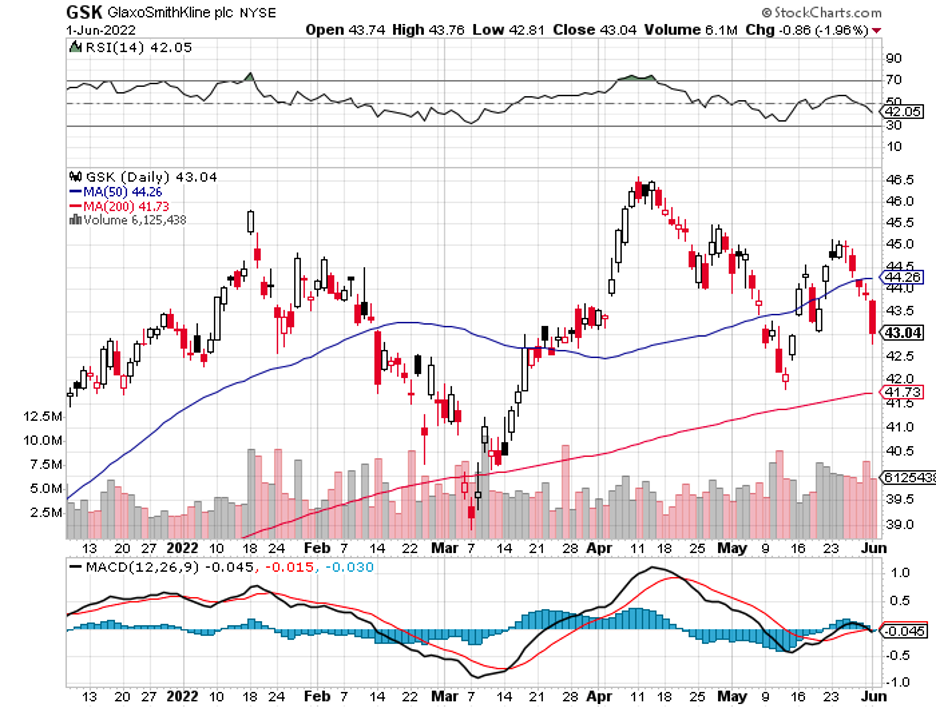A Solid Biopharma Filled with Promising Catalysts
If the rumblings in the market have you laboring just to get a full night’s rest, know that you are not alone. What’s more comforting is that you are not defenseless in this situation.
It pays to buy stocks that will still be worth something to your investment portfolio in uncertain periods, even if these end up getting torn apart a bit due to political and economic issues.
One of them is GlaxoSmithKline (GSK).
With a massive market capitalization of over $104 billion, GSK is recognized as one of the most prominent biopharmaceutical players in the healthcare sector.
Primarily due to its extensive portfolio of drugs and services, ranging from amoxicillin to antidepressants, this company raked in roughly $46 billion in 2021.
This shows off a quarterly increase in revenue by 40% in the past five years, with a quarterly free cash flow rise of 378%. Among other factors, these figures are indicative of GSK’s long-term health.
Regarding its revenue-making capacity for shareholders, the company’s forward dividend is recorded at $2.92, putting its yield at approximately more than 5%. This is higher than the average recorded by the market, which is 1.2%.
While this sounds great, investors should be aware that GSK’s dividend doesn’t necessarily come with the guarantee of climbing over time.
Actually, the company’s payout has only increased by 13.3% over the past 10 years. So, it’s reasonable to believe that the figure would most likely stay the same.
Nevertheless, GSK has more revenue streams to add in the short term. The company has 5 varying treatments queued for registration.
That is, if they gain regulatory approval, GSK would have 5 new drugs to launch soon.
On top of these, the company has a myriad of late-stage candidates in its pipeline that hold the potential to advance in the following years as well. Evidently, GSK isn’t short on promising growth catalysts.
In another move to bolster its pipeline, GSK recently announced its plan to buy Affinivax for roughly $3.3 billion. If everything goes well, GSK will add this Boston-based company to its portfolio to expand its vaccine programs by the third quarter of 2022.
This move is one of the many decisions GSK made in preparation for the impending spinoff of its consumer healthcare business, Haleon, which is anticipated to happen by July 2022.
The plan is to have 80% of GSK’s holdings in Haleon be spun off to its shareholders while the company retains 20% to strengthen its financial standing. Pfizer (PFE) will get the remaining ownership.
Considering the brands under Haleon, including Sensodyne, Panadol, and Centrum, this future spinoff is projected to become a world leader in the field of consumer healthcare. Clearly, GSK shareholders would benefit greatly from this plan.
Another recent move to broaden its pipeline is GSK’s $1.9 billion agreement with Sierra Oncology.
This deal, which is also expected to reach completion by the third quarter of 2022, will add bone marrow cancer drug candidate Momelotinib to GSK’s pipeline.
Momelotinib targets myelofibrosis patients with anemia. The estimated number of individuals with myelofibrosis in the US alone is 20,000.
While there’s no fixed number on the drug’s target market, we can only look at the history of patients.
Typically, 40% of myelofibrosis patients are already battling anemia upon diagnosis, and virtually all of them eventually develop the condition.
Conservatively, I can say that 70% of the total patient population has anemia. This would amount to roughly 14,000 eligible patients.
At the moment, only a handful of treatments target myelofibrosis. One of the most popular is Jakafi from Incyte (INCY).
However, Jakafi and chemotherapy fail to yield results consistently, Momelotinib could become a viable option for the target population.
As a relatively new candidate, it’s reasonable to assume that Momelotinib could seize only 35% of this market or roughly 4,900 patients.
So far, there’s still no pricing information for Momelotinib, but the $120,000 average expense for cancer treatment annually is a good indicator in terms of an estimate.
Taking into consideration other factors like patient assistance programs and the adjustments in prices from negotiations with health insurers, then Momelotinib could reach pricing of $80,000 for each patient.
This could total approximately $400 million in yearly sales in the US alone. Since the US comprises 40% of drug spending worldwide, there is an excellent chance that Momelotinib will reach $1 billion in annual sales.
Putting this in perspective, $1 billion in additional revenue yearly would amount to a 2.2% boost over GSK’s $45.9 billion expected revenue in 2022.
Needless to say, this Sierra Oncology deal is more than enough to move the needle for the company.
Overall, GSK has an exciting year ahead. With the Haleon spinoff and the continuous growth of its pipeline, it’s easy to see why this company is an excellent long-term investment.

